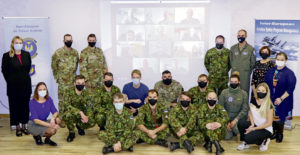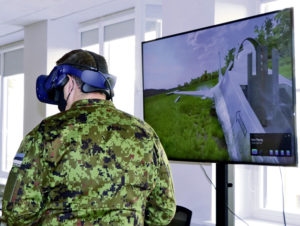
TALLINN, Estonia — The Inter-European Air Forces Academy and subject matter experts from U.S. Forces in Europe and Air Forces Africa Safety office successfully concluded a two-week Inter-European Aviation Safety Program Management Course Sept. 25, in Tallinn, Estonia.
Adhering to stringent COVID-19 restrictions, IEAFA delivered its first hybrid course — bringing together 25 students from seven nations. Estonian students attended in-residence with partners and allies dialing in virtually from the Czech Republic, Finland, Greece, Latvia, Luxembourg and Slovakia.
IEAFA’s Aviation Safety Program Management course contributes to focused development of a common safety culture and a cadre of NATO and Partnership for Peace aviation safety professionals who together can continually improve the safety of air operations in Europe. Lt. Col. Robin Cadow, IEAFA commander, underscored the importance of such courses.
“These classes not only increase ally and partner interoperability, but they also deepen trust on the very human level that organizations like NATO and Partnership for Peace are built upon.”
Of significance, this course validated the use of the Air Force’s first-ever Virtual Reality Crash Lab in a learning environment, increasing allied and partner interoperability in conducting aircraft mishap investigations. The VR Crash Lab interactively illustrated how to collect, protect and preserve mishap evidence. Students were given checklists and real mishap evidence to process and inventory. The VR lab added a unique realism to teach the concepts of mishap response.
Students completed blocks of instruction on risk management, air safety, and mishap response, all with the aim of developing their individual skills, performing national missions, developing interoperability with allies and partners and setting the stage for future work in multi-national exercises and operations.

Students participated in multiple classroom sessions, “breakout” team sessions where in-classroom tablets brought in-resident and remote students together in small groups and enjoyed guest speakers from USAFE and the Air Force Safety Center. Taking advantage of the challenges created by travel restrictions, Estonian students visited Amari Air Base while remote students visited their local airfields then briefed fellow students — in effect allowing everyone insight into safety operations at seven airfields across EUCOM instead of just one.
Maj. Dwight Rabe, USAFE-AFAFRICA Flight Safety division chief, led the instructor team and challenged students to seek out opportunities to see and apply the real-world principles from the course.
“It was an excellent learning point for our students to see [Amari] Air Base and the facility and gain a first-hand impression of what flight safety looks like.“
Maj. Christophe Schaber, the first member of Luxembourg’s air force to attend the course, did so from a remote out-station in Spain.
“It was a really great experience — I loved it,” he said. “We had a lot of subject matter experts and a big advantage to have so many people from so many backgrounds here for a single purpose.”
The IEAFA is located at Kapaun Air Station, and is a squadron that falls under USAFE’s Warrior Preparation Center. Its mission is to strengthen NATO and Partnership for Peace cooperation through education and training of the allies’ only common weapon system, people. IEAFA offers combined officer and enlisted Professional Military Education and technical training courses and has trained more than 900 allies and partners from 42 different nations to date.


